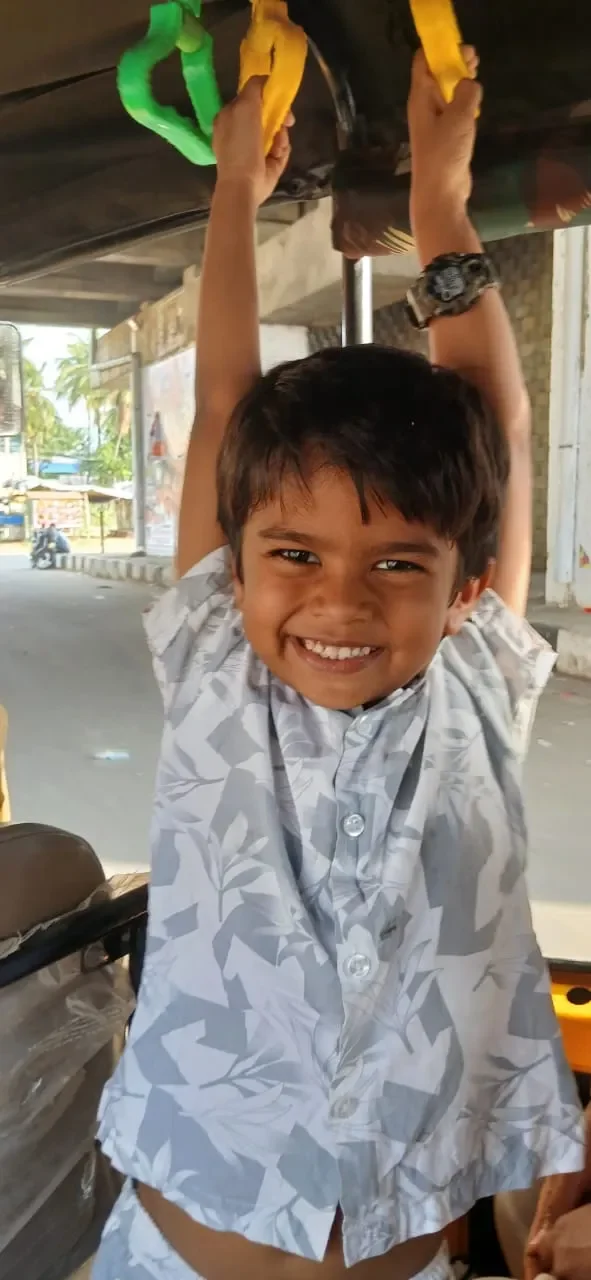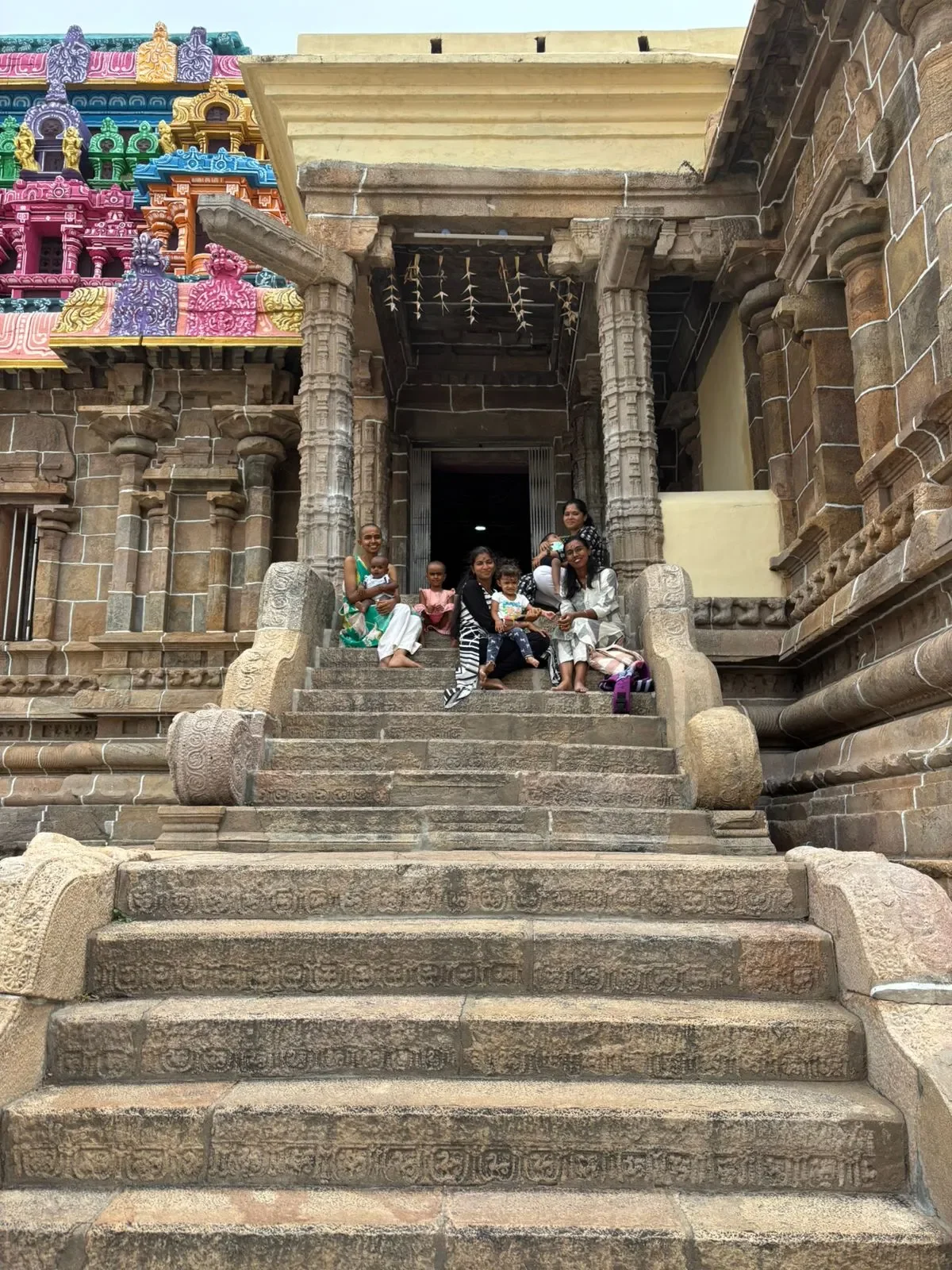Kumbakonam- The First OMW Host.
I’m Shwetha, and it’s been ages since I last wrote. So here I am, taking it up as a little challenge — because why not? Writing always helps me pause, reflect, and of course, tell a story or two. This one is about my recent trip to Kumbakonam, as part of a beautiful initiative by the OMW community. For those who don’t know, OMW stands for Online Minimalism Workshop — a gathering of hundreds of people who’ve completed Durgesh Nandhini’s course this year, we began something new: theOMW Host. The idea is simple — one member opens up their home to a few families, holding a themed gathering. The theme could be anything: a call for help, a skill to share, a new healing modality to explore, or simply a space to give and receive. Our very first meet took place in the temple town of Kumbakonam, at Anu’s home. Her chosen theme was to immerse us in the rhythms of the town and discover its many trades.
I was surprised at my son’s(5 year old) capablity to adapt. He would explore the current surrounding, find what’s interesting for him and engage — it was like ta daaa, and he adapted to Anu’s place, the new people, the new plays, the food and commutes.
What struck me the most was this — six strangers, each with a child in tow, all landing up at Anu’s house in Kumbakonam. Anu herself was a stranger to us. And yet, there we were, unpacking bags, sharing rooms, figuring out who takes the bathroom next, like we’d known each other for years. The only thread binding us was the OMW mindset — a shared way of seeing and being that we had each picked up through our year-long mentorship with Durgesh Nandhini, though in different batches. That common ground made it easy to listen deeply, to simply be in each other’s company, and to open our hearts without hesitation.
The beauty was in the sharing — rooms, food, even bathrooms. We kept an eye on each other’s children when a mother’s hands were full. At mealtimes, raw vegan plates sat next to regular vegetarian ones, and nobody batted an eyelid. There was no judgment, only appreciation — for the ways each of us was consistently trying to give our bodies the best input we could. I remember on the first day feeling a bit worked up — my son refused the poriyal and sambar he usually eats at home. Instead, he chose plain rice with ghee. My mind started racing: Oh no, what will people think? That I never give my child healthy food? Then, i cleared the air saying to myself — that’s not important, you know who you are. Then, came the next loop — Will he be okay? Will he ever change? I caught myself mid-spiral. Alright, Shwetha, pause. You’ve given him options. Let him choose. He will learn through his own experiences. And with that, I shifted my focus back to my own plate — asking myself, How mindfully am I eating? How much am I actually enjoying this meal?
The heart to host — that’s what touched me next. We turned Anu’s home upside down with our mess, yet lived in it as if it were our own. Chores became part of the togetherness. One moment I hold especially close is standing at the kitchen sink with Naga akka — me soaping the dishes, her rinsing — while she told me how she and her sister used to share work exactly like this when they were young. Anu and her entire family opened their home fully to us, making sure we were well-fed, had a comfortable commute, and enough private space to rest. Anu’s own restaurant, Ananth Unavagam fed us special meals with a lot of love. Between those, she treated us to thoughtfully arranged fruit buffets and fresh, colorful salads that felt as refreshing as the conversations we shared over them.
I realised, once again, the deep human need for social interaction — and how we truly thrive in such spaces. I learnt to ask for help. I learnt to set boundaries. I learnt to claim my own personal space without guilt. I became more aware of my emotions, able to pause and notice: I’m not comfortable here. I don’t have to put up with this. I can respectfully say no. These may seem like simple things, but for me, they’re a shift — because I’ve often chosen to adjust rather than truly adapt.
I don’t know how, but travel makes me calm. A new environment grounds me within hours, and I find myself observing my child without any rush. Back home, it’s always routines and deadlines, a constant doing rather than simply being. In Kumbakonam, as we explored the city, I even connected with my inner child — quietly asking, What do you like, Shwethu kutty? I was reminded that age is just a number, my friend. Age brings experiences, and those experiences shape the maturity in each person’s story — no comparisons needed, because each story is its own.
We had heartfelt sharing circles, where each of us spoke our own version of our life — our stories, our challenges, our rewards. Each was unique, yet we were all seeking the same thing: to better ourselves so we could experience life more beautifully. Ikkaraiku akkarai pachai — the grass is always greener on the other side — reminded me to hold more gratitude for what I have. And all i really took away was a little more curiosity about the emotions I was feeling, even the uncomfortable ones when i was listening.
Had I ever really seen how a business operates? And that too, the saree business? I’m so grateful to Anu for taking us to a weaver’s home and giving us that first-hand experience. I was deeply moved watching a silk saree come to life on the loom — each thread placed with such care. We spoke with the artisans and their families, hearing about their love for the craft and the bittersweet truth that they might be the last generation to carry it forward. In a world where handlooms are slowly fading, standing there felt like witnessing both beauty and loss at the same time.
Being in the temples filled me with a sense of abundance. It also sparked a curiosity in me to dive deeper into mythology and its stories. And then, there were the patterns — what I loved most about Kumbakonam. Patterns in everything. From the genius of Ramanujan, who showed us the many ways the same number can be expressed, to the temple premises, rich with intricate designs at every turn. I hadn’t been ready to travel solo with my son, but the chance to stay in a fellow OMW-ian’s home and explore alongside like-minded people helped me take the step — to keep traveling, for the stories I will gather and the hope they plant within me.
Authored by
Shweatha SathiaKumar





